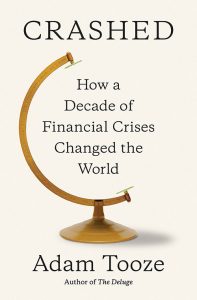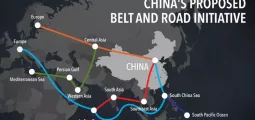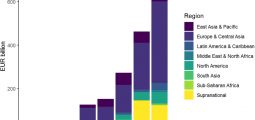Book Review by Kenneth Rogoff: Crash Time
Crashed: How a Decade of Financial Crises Changed the World by Adam Tooze
 Ten years after the collapse of Lehman Brothers, Crashed, by the noted Columbia University historian Adam Tooze, offers a sweeping history of the global financial crisis up to the era of Donald Trump. Above all, it is a scathing critique of the global fiscal-policy response to the crash. To guess the punchline, all one really needs to know is that the word “austerity” appears 102 times without ever being clearly defined. Does austerity mean actually reducing government spending and debt, or simply slowing the rate at which spending and/or borrowing rise? Tooze uses the same term to describe a confusingly wide range of policies and episodes.
Ten years after the collapse of Lehman Brothers, Crashed, by the noted Columbia University historian Adam Tooze, offers a sweeping history of the global financial crisis up to the era of Donald Trump. Above all, it is a scathing critique of the global fiscal-policy response to the crash. To guess the punchline, all one really needs to know is that the word “austerity” appears 102 times without ever being clearly defined. Does austerity mean actually reducing government spending and debt, or simply slowing the rate at which spending and/or borrowing rise? Tooze uses the same term to describe a confusingly wide range of policies and episodes.
Such freewheeling use of a freighted term muddles the discussion at key junctures. More broadly, it is emblematic of an economic analysis that seems to be rooted in a selective reading of left-leaning commentaries rather than primary economic or historical sources, much less a balanced survey of the scholarly literature.
For example, we are told that during the eurozone crisis, Greece was subjected to “the most draconian austerity program ever proposed to a modern democracy.” This would seem to suggest that the “Troika” – the International Monetary Fund, the European Central Bank, and the European Commission – was demanding that Greece immediately pare the overall size of its debts. In fact, the opposite was true. In the years following the crisis, when Greece lost access to fresh money from private markets, the Troika gave the country enough to meet all its payment obligations, plus a significant amount of additional fresh money, thereby reducing the magnitude of austerity it inevitably faced when its borrowing binge ended.
The Truth About “Austerity”
I wholeheartedly support Tooze’s assertion that during the crisis, Europe should have figured out a way to write down Greece’s debts, not to mention those of Portugal, Ireland, and Spain, which would have demanded equal treatment. Germany should have accepted this course of action, even if it meant increasing its own debt to recapitalize German banks that had lent to southern Europe. I argued this point widely at the time, both in public and with policymakers. Highly indebted countries cannot easily grow their way out of their burden without some form of heterodox policy intervention, be it default, inflation, or financial repression. Of course, in the case of the eurozone, the ECB had already taken inflation off the table.
“The IMF bailout program that Greece received was much softer than the one that was extended to East Asian countries in the 1990s.”
Nevertheless, the suggestion that poor Greece had to hand over hard cash to rich Germany is just false. Looking beyond Tooze’s weaponization of the word “austerity,” a straightforward accounting based on easily available public data shows that in the years after the crisis, Greece received more new loans and aid from its creditors than it was asked to repay.
Moreover, Greece’s experience was overwhelmingly the result of private markets turning off the borrowing spigot. When that happened, the Troika-furnished funds were no longer sufficient to prop up Greece’s unsustainable spending. According to the IMF, the Greek government in 2009 was running a “primary deficit” of 10% of GDP, meaning that its new borrowing was equal to all of its owed principal and interest, plus an extra 10% of GDP. So, after foreign capital flows came to a standstill in 2010 – partly owing to the revelation of accounting fraud on the part of the Greek government – Greece was going to have to make a massive fiscal adjustment of 10% of GDP, even if 100% of its debts had been written off!
If anything, Greece’s painful consolidation could have been far worse. The IMF bailout program that it received was much softer than the one that was extended to East Asian countries in the 1990s. Those countries had to flip their current accounts from steep deficits to surpluses on the spot. No wonder Asian financial leaders have complained about Greece receiving favorable treatment at the hands of the IMF and its predominantly European board of directors. Ultimately, the main reason for austerity in Greece was the country’s own pre-crisis profligacy, not the Troika’s post-crisis cruelty, whatever mistakes it might have made.
Tooze praises the Nobel laureate economists Joseph E. Stiglitz and Paul Krugman for the advice they offered to Greece’s newly elected socialist prime minister, Alexis Tsipras, and his colorful (and smart) finance minister, Yanis Varoufakis, after they took office in 2015. The Tsipras government came in breathing fire, promising both to stare down the Germans and the Troika, and to put an end to austerity, abandoning the euro if necessary. Looking back, one wonders if Tsipras was fully informed about his fragile bargaining position, and about who was giving money to whom. Greece had not yet begun to make debt repayments, and Tsipras was risking even tighter austerity in the near term by biting the hand that feeds. As for abandoning the euro, this might ultimately have proved to be the logical endgame, but the transition would take years and require cooperation, not confrontation, with Europe.
In the event, Tsipras and his economic advisers’ strategy turned out to be a disaster. Germany immediately called their bluff, and as Tsipras escalated his rhetoric, Greek citizens took €100 billion ($108 billion) out of the country, vastly worsening its plight. True, the Troika ultimately kicked in the €100 billion needed to prop up Greece’s banks; but that money might have been forthcoming anyway, and could have been put to much better use.
Too Soon to Say
Tooze makes much of the fact that the debt crises in Ireland and Spain were caused by banking-sector bailouts rather than fiscal profligacy (Portugal is in between). He is right. And yet, it is not as if the mortgage crises in these countries were the fault of the private sector alone. Official guarantees are another form of government expenditure, even if they are not accounted for in official government debt. As Carmen Reinhart and I document in our 2009 book, This Time Is Different: Eight Centuries of Financial Folly, massive “hidden debts” have a way of emerging from the woodwork in a crisis.
Over the course of history, it has not been uncommon for banking crises to morph into government-debt crises, as Reinhart and I showed in a 2011 paper. Several subsequent papers have underscored the fact that countries with high government debt suffer significantly deeper recessions after financial crises, partly owing to reduced fiscal space. And, given that systemic financial crises can lead to a decade of low to no growth, one can infer that highly indebted countries will have somewhat lower average growth rates over the long term, as virtually everyone who has published studies on the topic has found.
Tooze’s 2014 book, The Deluge: The Great War, America and the Remaking of the Global Order, has rightly been praised for its deep insights into how inadequate American leadership after World War I set the stage for the global political and economic crises of the interwar era. But his new book shows how historians can lose some of their comparative advantage over other scholars when it comes to researching contemporary events.
In The Deluge, Tooze was able to pore over memoirs and archival records that governments often take many decades to discover or make public. Indeed, a graduate student of mine has been researching late-1930s Bank of England policies, only to find that some archives can remain closed for up to 100 years if they are deemed sensitive. Though one can sometimes acquire redacted files through Freedom of Information requests, the restrictions are limiting.
Similar constraints apply to a study of contemporary events. Thus, in Crashed, Tooze is forced to rely much more on newspaper clippings and editorials (as opposed to primary sources) than a historian might otherwise prefer to do. To be fair, his judgments are often on the money. For example, he is right to conclude that ECB President Mario Draghi could never have made his famous July 2012 promise to do “whatever it takes” – allowing the ECB to use its balance sheet to issue de facto eurobonds – without Germany’s consent.
The €lephant in the Room
Curiously, Crashed places very little emphasis on the problem at the heart of the euro crisis: that the eurozone is a half-built house. Even though another Nobel laureate economist, Robert Mundell, famously championed the idea, it was a catastrophic mistake to put monetary union ahead of fiscal and political union. Europe is dealing with the consequences of that decision to this day. And, for the record, it was France, not Germany, that made the mother of all mistakes by insisting that Greece be included in the euro, despite a history of serial default and inflation.
What Mundell had wrong is that central bankers do not live in a world of their own. They may have a measure of independence when it comes to setting interest rates and targeting inflation; but at the end of the day, they are basically wielding a very liquid form of government debt. Monetary policy is simply one side of fiscal policy. Monetary union without fiscal union is an accident waiting to happen.
Of course, the eurozone’s founders sincerely believed that fiscal union would eventually follow monetary union. But the eurozone crisis – not to mention the ongoing migration debate and the United Kingdom’s withdrawal from the EU – shows that that day is a long way off. European policymakers simply did not have the tools to solve the crisis readily at their disposal, and it would be naive to think otherwise.
In his interesting book Europe’s Orphan: The Future of the Euro and the Politics of Debt, the Financial Times economics columnist Martin Sandbu suggests that Europe’s half-built house remains habitable. Yet, to my mind, it is not obvious that the eurozone can survive another deep systemic crisis, barring reforms in which weaker members establish capital controls, which would amount to a de facto multi-currency system.
Likewise, most economists in the US agree that the eurozone is not going to survive in the long run without a system of EU-wide shared fiscal responsibility and, yes, transfers on a much larger scale than what currently exists. That, in turn, will require tremendous political leadership. Anyone raising the issue of transfers with the Germans will run up against the fact that Germany’s elites sold the eurozone to their voters by promising that it would never become a “transfer union.”
Surely a historian ought to recognize just how difficult it would have been to advocate transfers and write-downs during the eurozone crisis. At the time, it had been only two decades since West German citizens began making massive transfers to East Germany, and those costs were still showing up as a special category in their tax bills.
The Benefits of Hindsight
Like many of those who have castigated certain EU member-state governments for inaction, Tooze seems to take the eurozone’s survival during the last crisis for granted, which is odd given how many of the economists he cites seem to believe that some form of dissolution is inevitable. Accordingly, he does not give German Chancellor Angela Merkel nearly enough credit for preventing a total breakup of the bloc, which would have had disastrous and far-reaching consequences.
In America, this is what we call “Monday morning quarterbacking” (football games are generally played on Sundays). With the benefit of hindsight, it is easy to think that one would have acted differently in the moment. Yet at the height of the euro crisis, the way out was far from obvious, and no one could have known what economic and political risks lay around the next corner. In fact, if real (inflation-adjusted) interest rates around the world had risen instead of fallen, things might have gotten a lot worse.
Interestingly, the one country that did bounce back relatively quickly was Germany, despite its needlessly procyclical budget policies. From a strictly German perspective, it is hard to see how Merkel and her finance minister, Wolfgang Schäuble, could have managed things any better. As Tooze himself acknowledges, writing down Greece’s debt would have been fraught with danger, not just politically but also legally. It is not even clear that the German Constitutional Court would have approved such actions.
Writing down the Greek debt would have involved a recapitalization of German (and French) banks, and that cost would have been multiplied many times over if other southern European debtors were extended equal treatment. German government debt easily could have risen by 20-40% of GDP – economically viable but hardly an easy sell. Although I personally recommended this strategy, I am reluctant to demonize the Germans for not adopting it.
Rose-Tinted Blinders
A related weakness in Tooze’s economic analysis is his failure to consider the difficulties of policymaking based on real-time forecasts. As any academic macroeconomist will tell you, the global economy never ceases to be uncertain and unpredictable.
To take just one example, neither central banks nor the overwhelming majority of the world’s investors had any clue how much real long-term interest rates would drop between 2007 and 2013. And yet that is the single most important variable in thinking about the sustainability of debt. Between mid-2010 and 2013, if real interest rates had risen by even half the amount that they ultimately fell, there would have been a fiscal bloodbath in some countries. Even today, there is still considerable uncertainty about long-term trends for real interest rates.
During the crisis, most policymakers were working with extremely overoptimistic forecasts, furnished not just by their advisers but by pretty much every expert out there. Ten years hence, it is now widely agreed that recessions associated with financial crises tend to be extremely deep, with very slow recoveries.
In 2009, when Reinhart and I published This Time Is Different, we offered quantitative benchmarks for post-financial-crisis recoveries, based on a massive historical data set (constructed over the course of seven years of research) that we made publicly available. For a long time thereafter, we were widely ridiculed for suggesting that the 2008 crisis was not so different from other systemic financial crises during the post-war era – and even dating back to the 1800s. We surmised that if the economy evolved as it had after past financial crises, recovery might easily take eight years, rather than nine months to a year, as in a normal cyclical recession.
From 2009-2010 and thereafter, the world’s major central banks, the IMF, the World Bank, and most private forecasters maintained that a normal rapid recovery was around the corner. Yet over the next eight years, the IMF was compelled to downgrade one annual growth forecast after another, and most central banks, including the Fed, were generally in the same boat.
In the Policymakers’ Shoes
If you are a politician who is being told that self-correcting mechanisms will soon assert themselves, then you are going to be very suspicious of anyone advocating radical measures, for fear that the side effects of the medicine might be worse than the disease. For his part, Tooze scarcely acknowledges that policymaking involves difficult calculations under great uncertainty, whether it be risks of a euro blowup or the second leg down in the global collapse of housing prices. But if he wants a culprit for the inadequate response to the crisis, he should blame the bad forecasts.
I saw this firsthand back in December 2009, when I wrote the first of several commentaries on why “Inflation Is Now the Lesser Evil.” My argument was that central banks should temporarily raise their inflation targets to a range of 4-6%, instead of the normal 2%. This would have brought about some modest deleveraging; but, more important, it would have raised employment demand in an environment of downward wage rigidity. Reinhart and I both argued in favor of massive infrastructure spending. But skeptical policymakers regarded my forecasts as far too pessimistic and considered my medicine overkill.
Meanwhile, proposals to write down the debts of low-income subprime mortgage holders enjoyed a slightly warmer reception, including by former President Bill Clinton in his 2011 book Back to Work, where he cited my call for such debt relief. But, again, policymakers were reluctant to pursue radical methods that would cost political capital and possibly create moral hazard, especially given that they thought economic conditions were already improving.
The situation in Europe was much the same. From 2010 onward, I and others suggested that the eurozone needed to write down sharply the debts of Portugal, Ireland, Greece, and probably Spain. Yet, at the same time, the IMF and the European Commission were offering rosy forecasts for Greece, which, as we all know, went on to suffer a massive and sustained output collapse. Policymakers failed to take radical steps when they had the chance because they were being told to stay the course by economic forecasters who simply could not accept that financial crises can significantly amplify the depth and length of recessions.
Correcting the Record
Crashed is an ambitious but ultimately flawed work. Much more could be said about it, space permitting. Still, I cannot help but push back against some of Tooze’s exceedingly sloppy citations of my own work. For example, he cites a Reuters story about an interview that I gave to the German paper Welt Am Sonntag in 2010. All of my statements were originally made in English, then translated into German, and then translated back into English by Reuters. Anyone who has ever dealt with the German press knows that they take great license with quotes in general, and with translations from English, in particular. No one sent me the article to be reviewed, and even if they had, I do not read German.
At any rate, Tooze quotes me as saying that, “Germany’s debt is unsustainable, and someday it would be like Greece.” As an expert on Germany, Tooze should know that taking this quote at face value is like citing a tabloid as though it were congressional testimony. The quote is idiotic, and I never said – or would have said – anything of the kind. After all, I wrote occasional commentaries and gave a number of interviews on the European debt crisis, and I knew – from my days at the IMF – always to say exactly the same thing. Had I wanted to make this ridiculous prediction about Germany, I would have made it many times and in many places. But I didn’t. (In fact, I had never even seen the quote Tooze attributes to me before his book was published.) I knew only that I was being criticized in some quarters for advocating debt write-downs and higher inflation.
I suppose I should be flattered to be included alongside such high-profile figures as then-Fox News personality Glenn Beck. But I am not, and I cannot look past the fact that a skilled historian would find such an absurd quote to be a credible representation of my analysis. Tooze also chooses to cite a casual television appearance by another noted economic historian, Niall Ferguson. It is puzzling that Tooze did not, instead, cite Ferguson’s 2008 book The Ascent of Money, which anticipated some of the trouble to come a decade before Tooze ventured into contemporary economic history.
Finally, Tooze grotesquely misstates the results of my work with Reinhart on growth and debt (written after our book) and claims it was riddled with errors. This is polemic nonsense, as any serious scholar who has looked at the matter would realize.
Tooze seems to have read deliberate misstatements of our results rather than the original texts and related writings. For example, we have found that countries with debt over 90% of GDP (taken as a group) grow much more slowly than countries with debt under 90% of GDP (taken as a group). This does not imply a sharp growth slowdown at the 91% mark, any more than an increase in one’s cholesterol reading from 199 to 200 suddenly implies a heart attack, or that 200 is just as bad as 300. Nor do we claim one-way causality. But Tooze would have had to read the work to know these things. Curiously, Reinhart and I viewed our work on debt and growth as supporting the case that peripheral Europe could not be expected to outgrow its massive debts without huge write-downs. Tooze seems to agree. The ten years of data now available since our paper was published hardly seem to contradict this forecast.
By and large, historians are better than economists at telling a story, and the writing in Crashed is no exception. Tooze offers a passionate account of the past decade that many readers – much like viewers who watch only a single one-sided news channel – will find reaffirming. But for such a thick book, the research and economic analysis are often remarkably thin. It took economic historians seven decades to unpack the Great Depression. It is safe to assume that historians will have much more to say about the 2008 financial crisis in the years and decades to come.
About the Author
Kenneth Rogoff, a former chief economist of the IMF, is Professor of Economics and Public Policy at Harvard University.
You may have an interest in also reading…
BLKB: Regional Bank that Favours a Future-Orientated Approach
What impact do corporate actions have on individuals, society and the environment? Can we take responsibility for the world we
Norvestor: A Sustainable Long-Term Value Proposition in Private Equity
The disclosure of environmental, social, and governance (ESG) practices by private equity funds has been associated with a 4.9 percent
Article 50 Invoked: For All the Wrong Reasons
Driving a wedge right down the middle of British society and shattering a disconcerting number of endearing stereotypes, Brexit has




























































































